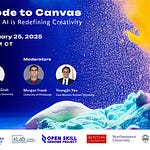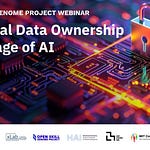Panelists:
Yong-Yeol “YY” Ahn, Professor, Center for Complex Networks and Systems Research, Luddy School of Informatics, Computing, and Engineering, Indiana University Bloomington
Renzhe Yu, Assistant Professor, Learning Analytics & Educational Data Mining; Faculty Member, Data Science Institute; Research Affiliate, Community College Research Center; Teachers College, Columbia University
Moderator:
Morgan Frank, Assistant Professor, Department of Informatics & Networked Systems, School of Computing and Information, University of Pittsburgh
Last week, our team at Open Skill Genome Project—a collaboration between xLab at Case Western Reserve University, the University of Pittsburgh, and the Digital Credentials Consortium (DCC) at MIT, with support from the Walmart Foundation—hosted a webinar exploring how AI is reshaping the labor market, skills ecosystems, and educational pathways. As part of our mission to build an open, verifiable credential infrastructure powered by Artificial Intelligence, we share cutting-edge research on the future of work, the role of digital credentials, and emerging tools that connect talent to opportunity. This session focused on how AI can help workers map career transitions and how educational institutions can respond to the new demands of the AI era.
Insights on Skills Mapping and Educational Equity
Morgan Frank, Assistant Professor at the University of Pittsburgh and co-principal investigator of our project, moderated the session. He led a dynamic discussion with two leading scholars: Yong-Yeol (YY) Ahn, Professor at Indiana University Bloomington, and Renzhe Yu, Assistant Professor at Teachers College, Columbia University. Together, they unpacked how AI technologies are transforming the way we understand skills, design career pathways, and support student success in a rapidly evolving economy.
Mapping Career Transitions with AI
Prof. YY Ahn shared his team’s work on creating dynamic “maps” of the labor market. These maps visualize the relationships between skills, jobs, industries, and educational backgrounds. Traditional network-based maps—built from observed transitions between occupations—can be useful but are often rigid and incomplete. To address these gaps, Prof. Ahn introduced an innovative approach using neural network-based embeddings that are more flexible, adaptive, and interpretable.
Drawing from previous research on scientific mobility, Prof. Ahn explained how embedding models can predict how easy or difficult it is to move from one role to another based on real-world job trajectories. These AI-driven maps offer powerful tools to support workers and learners navigating career transitions, identifying skill gaps, and planning future training.
Understanding Student Success in the Age of Generative AI
Prof. Renzhe Yu presented new findings on how generative AI tools like ChatGPT are already affecting student learning outcomes—particularly in academic writing. His research, based on over a million student writing samples, found that overall writing proficiency increased after students gained access to AI. Notably, the gap between native and non-native English speakers narrowed. However, the benefits were concentrated among students from higher socioeconomic backgrounds, raising concerns about equity.
Prof. Yu also shared research on how under-resourced colleges can responsibly adopt AI, even with limited data or technical capacity. His team is exploring collaborative model development, privacy-preserving architectures, and strategies to ensure AI tools serve diverse student populations. His message: equity and ethics must be foundational in education’s AI transformation.
The Future of AI, Work, and Learning
The panel wrapped up with an engaging Q&A exploring the long-term impact of AI on careers and education. Some key takeaways included:
AI-powered career maps can help workers understand where they are, what roles are adjacent, and what it takes to transition.
Foundational skills matter more than ever—critical thinking, collaboration, and the ability to evaluate AI outputs will define future-ready talent.
Educational equity must remain a priority—especially as wealthier institutions and students adopt AI more quickly.
Digital credentials paired with AI can unlock new opportunities, but only if systems are designed to be inclusive and adaptive.
WHAT’S NEXT?
Realizing the Promise of Learning & Employment Records
Scaling Impact through Collaboration
📅 Save the date: Tuesday, April 22 | 12–12:50pm ET
Join us on Tuesday, April 22, from 12–12:50 PM ET for our next webinar, focused on Learning and Employment Records (LERs)—a powerful framework for capturing and connecting individuals' skills to real-world opportunities. Realizing the full promise of LERs requires open standards, thoughtful design, and strong cross-sector collaboration. In this session, we’ll highlight how initiatives like the LER Accelerator and Open Skill Genome Project are building the technical infrastructure, institutional capacity, and policy momentum needed to make LERs work at scale. Whether you're designing digital platforms, shaping education policy, or implementing credentialing solutions, this webinar offers practical perspectives on turning LERs from research to application.
Featured Speakers:
Kerri Lemoie, Ph.D. – Director, Digital Credentials Consortium (DCC) at MIT
A leading voice in digital trust and decentralized identity, Dr. Lemoie brings deep expertise in digital credential infrastructure and helped shape the Open Badges standard.Mark McConahay – Sr. Consultant and Innovative Credentials Coordinator, AACRAO Consulting
With decades of experience in student records and innovative credentials, McConahay supports institutions in adopting scalable, learner-centered credentialing systems.Rob Coyle – Technical Program Manager for Digital Credentials, 1EdTech
A specialist in credential standards like Open Badges and Comprehensive Learner Records, Coyle brings cross-sector insight from K–12, higher ed, and workforce training.









